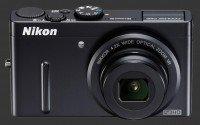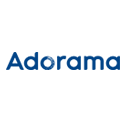Nikon Coolpix P300 Review
Nikon Coolpix P300 Usability - How easy is it to use?
The Nikon Coolpix P300 has a simple and elegant design where almost every button does exactly one action. It is one of the smallest compact digital cameras and is minimalistically shaped like a box with a protruding lens barrel and a number of external controls. Notably absent from this design is an actual hand-grip, only a slightly protruding strip of rubber takes its place at the front of the camera. The camera is easy to hold but does not feel very secure without using a wrist-strap.

The top of the camera is quite busy. From left to right, there is the built-in flash, the stereo microphone, the mode-dial, the power-button, the shutter-release which is surrounded by the zoom-controller and the top control-wheel. The mode-dial protrudes the most and is easy to turn with good detents to avoid accidental changes. The tiny power button is flush with the surface and must be held down for the camera to power-up, making turning on the camera unintentionally nearly impossible. The shutter-release is a little small with a short amount of travel and distinct half-way point. The top control-wheel has clear detents and is comfortably accessible from the rear.
The mode-dial has 8 positions, 4 of them occupied by the usual PASM modes. There is also an Auto mode, marked by a green icon, which hides all items from the camera menu except for image resolution. Since there are no external controls for ISO, WB and drive modes, all these settings are locked in Auto mode. There is a position for Backlighting mode which either performs HDR blending or uses the flash as a fill-light. Another position is for Night Landscape which either uses a long exposure or multi-frame noise-reduction. The last position groups all other Scene-Modes. To choose a specific Scene-Mode, the camera menu must be used.
Sweep Panorama modes automatically show grid lines to help keep the camera level. This helps but does not show when you are straying. To give some necessary leeway, the P300 reduces the vertical field-of-view of the lens. This makes sense in landscape orientation but not in portrait. Unlike in Panorama Assist mode, the camera does not make the user choose a direction first, so it has no way of knowing which way to reduce the field-of-view.
 The sides of the camera are almost bare. On the flash-side, there is a spring-loaded lever to release the popup flash. Pushing the flash down locks it back in place. The grip-side of the P300 has a mini HDMI plug and a loop to attach a wrist strap. The HDMI connector can output a 1080i, 720p or 640p signal. The loop is slightly bothersome if you hold the camera tightly.
The sides of the camera are almost bare. On the flash-side, there is a spring-loaded lever to release the popup flash. Pushing the flash down locks it back in place. The grip-side of the P300 has a mini HDMI plug and a loop to attach a wrist strap. The HDMI connector can output a 1080i, 720p or 640p signal. The loop is slightly bothersome if you hold the camera tightly.
The rear of the Nikon Coolpix P300 is dominated by an excellent 3" LCD with 920k pixels. The image is crisp and bright with good but slightly over-saturated colors. Outdoor visibility is superb, better than most digital cameras. White-balance is accurately shown on the display but the camera makes no attempt at providing an exposure-priority view and does not take into account the exposure-range of the camera.
To the right of the LCD is the Movie-Record button, marked by the universal red dot. Pressing it starts video recording, pressing it again stops it. There is no video mode on this camera and no HD framing guides. So, as usual, there is no way to accurately setup framing for video. This also causes a 2 second delay before video-recording starts, making video recording rather frustrating.
 Directly below is the Playback button. It works in the most obvious way, entering and exiting Playback mode. It can also turn on the camera into Playback mode without extending the lens. The camera is shooting-priority at all times, so a quick tap of the shutter-release returns it to Capture mode.
Directly below is the Playback button. It works in the most obvious way, entering and exiting Playback mode. It can also turn on the camera into Playback mode without extending the lens. The camera is shooting-priority at all times, so a quick tap of the shutter-release returns it to Capture mode.
A rotating 4-way controller below the Playback button combines a control-wheel, quick access to functions and menu navigation in a single control. Each direction is assigned to a function:
- Up brings up a 5-item menu of flash-modes.
- Down enables or disables macro focusing.
- Left brings up a 4-item menu for the self-timer.
- Right - See below.
To activate anything, one must press the correct direction, rotate the dial and then press OK to confirm. Otherwise, the item-menu disappears without any effect after about 5 seconds of inactivity. One can say that this reduces chances of inadvertently changing something but it makes the each change less efficient. This is particularly annoying with the self-timer which resets itself after each use. When repeatedly shooting from a tripod it therefore takes 4 unnecessary stepsLeft, Turn (or Up), Turn (or Up), OK. between each shot.
The right direction oddly shows a horizontal menu with 5 options: Hue, Vividness, Exposure-Compensation, Exit and Reset. The rear dial is used to choose between one of these 5 items and the top dial is used to adjust each item when applicable. This makes changing EC somewhat awkward because one has to use both dials to do so, one to get the menu and the other to dial-in the amount. Speaking of EC, a live-histogram appears when EC is selected on the horizontal menu. While the histogram changes along with EC, it is only accurate within the camera's exposure range. You cannot rely on the histogram to always warn you of exposure problems. Since EC does not apply to manual-exposure (M) mode, there is no way to see a live-histogram in that mode.
The outer ring of the 4-way controller rotates and acts as the rear command-dial. It turns easily with gentle clicks. Being low on the back of the camera makes this one less comfortable than the top one. At least there are two! Inline with Nikon's one-function-per-control general philosophy, the top dial only controls shutter-speed or program shift and the rear one only controls aperture. For all modes but M, this means that one dial remains unused.
There are several ways this could be improved. One is to give the unused dial the task of changing ISO and another is to simply make both dials change the single parameter. The former would be preferable as it would provide access to ISO without entering the menu system. Since the top command-dial is more comfortable to use, it would be an improvement if the exposure parameter be controlled by that dial. In manual mode, both dials are busy and so ISO would still not have a direct control.
The central OK button is normally used to confirm menu selection. In Capture mode, it is unassigned except if the focus area mode is either Manual or Subject Tracking. In Manual focus-area mode, the OK button toggles the 4-way controller's behavior between activating directional functions and moving the focus-point. In Subject Tracking focus-area mode, the OK button starts and stops tracking. In Playback mode, the OK button switches between normal and detailed image views. The detailed view displays basic exposure parameters and a luminance histogram.
 The last remaining buttons are found below the 4-way controller: Menu and Delete. Menu obviously invokes the menu system. Delete prompts for deleting the image shown in Playback mode or the last taken image in Capture mode. The menu system itself is easy to navigate and well organized into 3 tabs: Still, Movie and Setup. There is not much in the way of customization and that keeps the interface simple and relatively compact. There is also no control over file naming, images are always numbered sequentially and do not reset when changing memory cards.
The last remaining buttons are found below the 4-way controller: Menu and Delete. Menu obviously invokes the menu system. Delete prompts for deleting the image shown in Playback mode or the last taken image in Capture mode. The menu system itself is easy to navigate and well organized into 3 tabs: Still, Movie and Setup. There is not much in the way of customization and that keeps the interface simple and relatively compact. There is also no control over file naming, images are always numbered sequentially and do not reset when changing memory cards.
The construction of the P300 feels solid for the most part and is relatively light. The battery compartment door is thin and flexible. Next to it is a tiny and flimsy flap covering the combined USB and A/V connector. Unfortunately, this is the only way to charge the camera battery, so it is may get a lot more use than it can handle. If it breaks off though, this should not affect the functioning of the camera. Normally, charging via USB allows the camera to be A/C powered but this Coolpix does not support it. A metal tripod is next to the little flap and is neither inline with the lens nor with the camera's center of weight.
 |
Please Support Neocamera
All information on Neocamera is provided free of charge yet running this website is a huge endeavor. Purchases made via affiliate links found throughout the site help keep it running and up-to-date. There is no additional cost to you, so please consider buying via these links to our affilates:
If you found any information on this site valuable and did not purchase via our affiliate links, please considering donating via PayPal:
Any amount will be greatly appreaciated. Thank you for your support!
Nikon P300 Highlights

Sensor-Size: 6 x 5mm

Actual size when viewed at 100 DPI
| 12 Megapixels Fixed Lens | ISO 160-3200 |
| 4.2X Ultra-Wide Optical Zoom | Shutter 1/2000-8s |
| Built-in Stabilization | Full manual controls |
| 8 FPS Drive, 7 Images | Custom white-balance |
| 1920x1080 @ 30 FPS Video Recording | Lithium-Ion Battery |
| 3" LCD 920K Pixels | Secure Digital Extended Capacity, Internal Memory |
Updates
2024.11.18

Best 2024 Photography Gifts for Every Budget
Great gifts for photographers and photo enthusiasts selected for every budget among the best products of 2024.
2024.08.07

Eye Protection Tips for Professional Photographers
The four main considerations for professional photographers regarding eyewear.
2024.07.14

Fujifilm X100VI Review
Flagship fixed-lens compact digital camera with a 40 MP sensor and Image-Stabilization, a first for the series. Retro design featuring dual control-dials, plus direct ISO, Shutter-Speed and EC dials. Its hybrid viewfinder can switch between EVF and OVF mode.
2024.05.09

Fujifilm GFX100 II Review
Flagship 102 Megapixels Medium-Format Mirrorless Digital Camera with 8-Stop 5-Axis IBIS, 8 FPS Drive, 8K Video and 400 MP Super-Resolution capture in a weatherproof and freezeproof body with dual control-dials and dual memory-card slots.
2024.04.03

Fujifilm X-T5 Review
Newest Fujifilm flagship boasting a 40 MP APS-C sensor, 5-axis IBIS with 7-stop efficiency, 15 FPS continuous drive, 6.2K Video capture, dual control-dials and dual SDXC UHS-II slots in a sturdy weatherproof and freezeproof body.
2023.11.20

Best Digital Cameras of 2023
Find out which are the Best Digital Cameras of 2023. All the new Mirrorless Digital Cameras from entry-level to high-end professional.
2023.07.10

Fujifilm X-H2 Review
40 Megapixels APS-C Hybrid Mirrorless Digital Camera with 7-stop IBIS. Fastest shutter ever and 8K video capture. Large builtin EVF with 0.8X magnification and 5.8 MP, plus an Eye-Start Sensor. Packed with features and large number of controls in a weatherproof and freezeproof body.
2023.05.07

Sony FE 20-70mm F/4G Review
Review of the unique Sony FE 20-70mm F/4G lens. The optical zoom of this lens spans ultra-wide-angle and medium focal-length coverage, making it one of the most versatile Full-Frame lenses on the market.
2023.01.15

Huion Inspiroy Dial 2 Review
Review of the Huion Inspiroy Dial 2 tablet, a medium sized drawing surface with dual dials and customizable buttons. Connects via USB-C or Bluetooth 5.0 with Windows, Linux and Android support.
2022.12.08

How to Pack for a Photo Trip
Find out how to pack for a travel photography trip, carry your gear safely while meeting airline regulations.
2022.11.13

Best Digital Cameras of 2022
The best digital cameras of 2022. A short list of the most outstanding models in their respective categories. Choose one for yourself or as a gift.
2022.09.21

Pentax DA* 60-250mm F/4 SDM Review
Review of the Pentax DA* 60-250mm F/4 SDM, the constant-aperture telephoto zoom with the highest zoom-ratio on the market.











